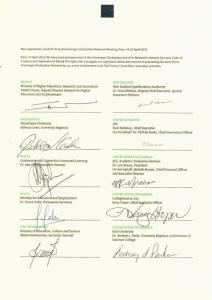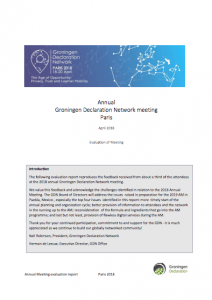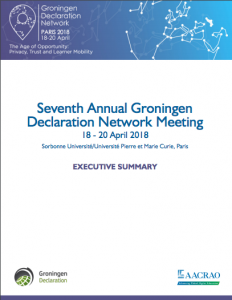France had long been on the GDN wish list of countries to get involved in the Groningen Declaration, and at our second meeting, in 2013 in Beijing, we were very happy that Mariana Losada stepped in on a shared keynote. Since then, the GDN Office has patiently been collecting a list of interested French stakeholders.
When news broke out in January 2016 about the initiative for the establishment of a French Service d’Attestation Numérique des Diplômes – a French Digital Diploma Attestation Service – that interest only grew. With the advent of the new French administration of Emmanuel Macron in 2017, it really started to look like the time could have come for France to take the lead in digitisation in the field of education. Some of the items singled out by Macron in his bold Initiative for Europe speech of 26 Sep 2017 are GDN staples:
- Human Mobility
- Life-Long Learning
- Reaching out to Refugees
- The Promise of Further Digitisation
Perhaps auspicuously, that speech was held in the same Sorbonne that will see the GDN assemble in April, at a Sorbonne that in Macron’s words:
…did not start out as a prestigious building. It was first and foremost an idea. An idea supported by a few scholars and their disciples, who built their future sitting on straw. [Today’s] lecture theatre does not make the Sorbonne … the Sorbonne lives today because of the idea that its professors and students have of knowledge: an idea whose vitality has already lived on through eight centuries.
So, it may have been a lucky strike when in March 2017, the GDN formally contacted the Université Paris1 Panthéon-Sorbonne to host the GDN 2018 event and help showcase the global relevance of the issue of digital student data portability.
While meeting in Melbourne, news reached us that Georges Haddad, president of the Université Paris1, approved of the idea, and that Sorbonne would host this event. That was most welcome news. Sorbonne was purposely chosen as the iconic backdrop for our annual meeting, to enable all major national and international players that are based in Paris, like UNESCO, OECD, IAU, the French Ministry of Higher Education, the BFUG Secretariat, AMUE, CNOUS, Campus France, and CIEP (NARIC France) to appear on stage and mingle with the GDN participants, including the World Bank, the European Commission, our signatories (and more).
Adding to this already powerful scenario, the European Commission recently announced its Future of Europe: Towards a European Education Area by 2025 vision, where the Sorbonne Process is promoted as a desirable further development of the Bologna Process. The proposed goals feature – yet again – many of the goals that the GDN has sought to promote from its start in 2012. Let us pick only the most directly conspicuous ones.
In the words of the Commission, this future European Area of Education should handle:
- Making mobility a reality for all: By building on the positive experiences of the Erasmus+ programme and the European Solidarity Corps and expanding participation in them as well as by creating an EU Student Card to offer a new user-friendly way to store information on a person’s academic records
- The mutual recognition of diplomas: By initiating a new Sorbonne Process, building on the Bologna Process, to prepare the ground for the mutual recognition of higher education and school leaving diplomas
- Promoting lifelong learning: By seeking convergence and increasing the share of people engaging in learning throughout their lives with the aim of reaching 25% by 2025
In sum, so many global initiatives seem to be converging on the field of digitisation for the good of education that the time is right for GDN to showcase these efforts.
We hope the GDN vision appeals to you and your work. Let us add that while Paris needs little recommendation, as the City of Lights has been able to do without for ages, it is nonetheless a superb destination.



